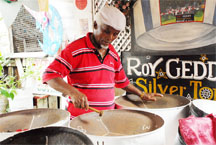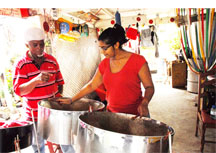“I will die a pan man”
Guyana’s steel pan icon Roy Geddes talks with Guyana Review about his life and his music
You wouldn’t guess that Roy Geddes is seventy. Clad in his trademark Kangol and jeans Guyana’s celebrated Professor of Pan looks a full ten years younger. Now retired from the more hectic pursuit of pan-playing his active mind remains preoccupied with the art form that has been his life. He talks about steel pan with the demeanor of a wizened veteran exuding the authority of a man who, this year, celebrates his fifty sixth year as a pan man.
Pan in Guyana goes back to 1947 just two years after its origins in Trinidad and Tobago. It started, Geddes says, “in backyards” and in the seedy pre-independence inner city slums of the capital. “Steel band started in the ghetto; in alleyways and on corners. It was a typical Porgy and Bess environment.”

Those years have been punctuated by two National Awards, a host of accolades and the unquestioned distinction of being one of the last of the great pan men of the Caribbean. How to take pan out of the ghetto; how to burnish its image and to locate it in what he describes as “a beautiful place” is Roy Geddes’ remaining ambition. He wants to leave a legacy that is about Pan rather than self; a legacy that acknowledges the humble origins of the music and pays deserving tribute to the hard men of the art form who, more than half a century ago, gifted the sound of the cultured oil drum to the pantheon of the performing arts.
From Geddes’ own informed perspective, pan music, for all its celebration, for all its national acclaim, remains a prodigal son, still without a real place at the table of national culture. He believes that long ago we ought to have created some national shrine, some lasting public monument to pay fitting tribute to the role and the relevance of the steel pan. Until that happens Roy Geddes’ work will remain undone,
Pan Geddes says, has been his life. “From very early on I was bombarded with pan. At Leopold and Cross streets there was the Chicago Steel Orchestra; there was the Casablanca Steel Orchestra in High Street and then there was the Tripoli Steel Orchestra in Leopold Street. These were the recognized bands of the day and they were all part of my own steel band experience.”

When you ask Roy about the journey that pan has made over those more than fifty years he pauses and fixes you with a beady-eyed stare. “I am not happy.” His voice recedes into a whisper as though someone else is eavesdropping. “There has been no real spiritual development in the art form. There has been a lot of technological advancement but I feel sad to say that there has been no forward movement as far as the spiritual development of pan is concerned.” By spiritual development he means “the transformation of pan into a vehicle through which there can be a better way of life for pan men, the men who have worked tirelessly for the development of the art form. After all those years there is still no organization and it seems that there is no love for the persons who have given us the pan. Unless pan men begin to matter the music itself is meaningless.”
He believes that much of the problem lies with the pan men themselves. “The art form may have come a long way but the pan men themselves have not evolved with the art form. They have to think of pan as a means through which they can give themselves a better way of life. I believe that the effort has to be collective. A band is a collective thing and if there is to be any forward movement it has to happen together.”
Geddes himself has brought the pan with him on his own personal journey through life. Through his boyhood days in the pan yards of Georgetown to his quiet retirement years he has embraced, and cared for pan music. Today, his home in Festival City is a well-ordered archive to the art form. Scores of magazine and newspaper cuttings, photographs of public performances noted events in his career and neatly framed listings of noted pan men, tuners and players, displayed on tables and walls. Pans adorned with the names of some of the best-known old-timers, the men he says who created steel band music, sit comfortably in the midst of a stunningly beautiful plant and flower garden; both well kept, both tended by himself and Pat, his wife of more than four decades. “I will die a pan man,” he says.
Walking along the garden path that leads from the street to his front gate you catch the halting notes of an amateur on the first pan. He gestures in the direction of the music. “I teach pan to anyone who wants to learn. I have a few students who come here and I teach pan at the Victoria Training Centre.”
On the subject of the once famed Roy Geddes Steel Orchestra Roy is deliberate and defensive. “There is no Roy Geddes Steel Orchestra right now. That is all I will say on that subject.”
“I do not wish to say any more right now.” You detect in his tone that the deeper story behind the disappearance of what was once Guyana’s best-known steel band embodies part of his own sadness with the wider challenges which the art form has had to endure.
When the discourse returns to the subject of his pan archive he performs an elaborate gesture with his hand. “All this is what we really need to share with younger people. We get schools from Berbice and other places coming here. My wife and I have kept this going and we are the gardeners too.”
As for the future of pan Geddes is thoughtful. “In the same way that we now nickel the pan I am interested in the nickeling the minds of the pan men. Everything is about people. We have played at all the concerts and delivered all of the classical music but the men, the real pan men have not been recognized. Pan is still in many ways perceived as “a ghetto thing.”
When you point out that children at some of the best schools have been playing pan Geddes dismisses this as a patronage of the art form. “There is a lot of pan in schools but we do not have bands, we do not have dedicated teachers. We may have a few people who know about pan but there is no commitment.”
He blames what he believes has been the stagnation of the art from on what he says is a colonial mentality. “Until now people are still demonizing pan men. The only thing that people pass on about a pan man is that pan men were bad boys. We may have come from the ghetto but there are people who have come from the ghetto and who have led honest lives. We never stop to think that good people have come from the ghetto.”
Last year, as part of the preparations for the Caribbean Festival of Arts (CARIFESTA) in Guyana Geddes was invited to help give shape to an envisaged National Steel Orchestra. “I have since withdrawn. It has not evolved in the way that it should. This has nothing to do with the Minister of Culture. It has to do with the mentality of the pan men themselves. When I was first asked to become involved I invited the tuners to my home so that we could work together to gain the kind of respect that pan deserves. Unfortunately, it fell apart because there was no togetherness. It is the same thing that has been coming against pan over the years. We hear nothing about the National Steel Orchestra. It is not performing and it is the people’s money that has been invested in forming the Orchestra.”
Geddes has his own perspective on the future of pan in Guyana. “I would like to see the art form gaining some respectability. We need to commercialize pan music more for the sake of the people in the industry. We need to develop pan production as an industry so that pan men themselves can be comfortable, can lead productive lives and can look after their families.”
He bemoans the disappearance of the pan yards. “That is where the music begins, in the pan yards. Where are the pan yards? Where are the cradles of pan music? These days the pan yards are mostly around tables where people, some of whom know nothing about pan talk about pan as if they know. These people know nothing about the amount of work that you have to do to produce a pan, to sync a drum.”
The current approach, Geddes says, is taking pan nowhere. “In any field the men who know must be given a chance. Pan men may not be academics but they know what is needed for the development of pan. Pan music cannot be developed around a table. It has to grow out of the pan yards, out of teaching and learning and out of performances.”
Geddes’ personal commitment to pan remains undiminished despite the challenges facing the sector. “I have taken bands far and wide in this country without the involvement of government or any other organization to raise funds for clubs. I have played for the church, for open air mass and for concerts. I have performed free of any charge just to give people an opportunity to listen to good pan.
The Chronicle Atlantic Symphony and Invaders have also done their part. Back in the old days Quo Vadis also played its part. There was a time too when there were competitions involving up to fifteen bands. Now we have two and three bands playing in competitions.
